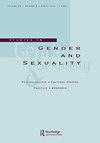白人受虐狂的种族契约
Q3 Social Sciences
引用次数: 0
摘要
ABSTRACT 在这篇文章中,我批评了吉尔-德勒兹的《冷酷与残忍》(1967),这是他对利奥波德-冯-萨切尔-马索克的《穿裘皮的维纳斯》(1870)的介绍。在正确地强调了契约是受虐狂最重要的政治方面,也正是精神分析作为性理论无法解释的特征之后,我认为德勒兹未能正视使这种受虐狂成为白人的种族契约。德勒兹没有正视种族契约,而种族契约不仅是社会契约的基础,也是受虐狂契约中隐含的社会性的基础,因此德勒兹将受虐狂理想化了。我从有色人种同性恋批判,尤其是Amber Jamilla Musser的著作中汲取灵感,展示了反黑人如何在性爱双方努力寻求接近死亡的欲望模式时,对受虐契约进行补充。尽管德勒兹对精神分析错误地在施虐与受虐之间建立的互补性进行了有力的批判,但在本文的最后,我还是要说明种族契约是如何使施虐与受虐在这种情况下成为互补的。本文章由计算机程序翻译,如有差异,请以英文原文为准。
The Racial Contract of White Masochism
ABSTRACT In this article I critique Gilles Deleuze’s “Coldness and Cruelty” (1967), his introduction of Leopold Von Sacher-Masoch’s Venus in Furs (1870). Having rightly emphasized the contract as the most important political aspect of masochism, and precisely the feature that psychoanalysis, as a theory of sexuality, could not account for, I argue that Deleuze nonetheless fails to confront the racial contract that renders this masochism white. By failing to confront the racial contract that informs not only the social contract but also the sociality implicit in the masochistic contract, Deleuze idealizes masochism. Drawing from queer of color critique, and especially from the work of Amber Jamilla Musser, I show the ways in which anti-Blackness supplements the masochistic contract in the effort of the sexual parties to reach for that modality of desire that approximates death. Notwithstanding Deleuze’s powerful critique of the complementariness that psychoanalysis wrongly establishes between sadism and masochism, I conclude this article by showing how the racial contract makes it possible for sado-masochism to become complementary in this case.
求助全文
通过发布文献求助,成功后即可免费获取论文全文。
去求助
来源期刊

Studies in Gender and Sexuality
Social Sciences-Gender Studies
CiteScore
0.80
自引率
0.00%
发文量
15
期刊介绍:
Beginning in the final two decades of the 20th century, the study of gender and sexuality has been revived from a variety of directions: the traditions of feminist scholarship, postclassical and postmodern psychoanalytic theory, developmental research, and cultural studies have all contributed to renewed fascination with those powerfully formative aspects of subjectivity that fall within the rubric of "gender" and "sexuality." Clinicians, for their part, have returned to gender and sexuality with heightened sensitivity to the role of these constructs in the treatment situation, including the richly variegated ways in which assumptions about gender and sexuality enter into our understandings of "normality" and "pathology."
 求助内容:
求助内容: 应助结果提醒方式:
应助结果提醒方式:


